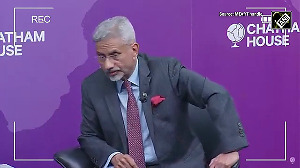 The founder of 'Better Place' said at the 2009 Frankfurt Motor Show that the electric transportation grid will go live in Israel in 2011, says Vandana Gombar.
The founder of 'Better Place' said at the 2009 Frankfurt Motor Show that the electric transportation grid will go live in Israel in 2011, says Vandana Gombar.
The first time I heard about what 'Better Place' wanted to do for sustainable transportation, I was impressed. To reduce the world's dependence on crude oil -- a commodity with a finite supply and volatile price -- this young company proposed to replace the liquid fuel transportation network with an all-electric network. The idea was so simple at the time that it was surprising no one had thought of it before.
Quintessentially, this California-headquartered company proposed a dare to replace petrol/diesel cars on the road with electric vehicles and petrol pumps with battery recharging/replacing vends. It wanted to yank out the oil model for transportation and replace it with an environment-friendly renewable energy model.
One of the first countries which committed to replace its petrol vends with battery feeders and substitute its liquid-fuel cars with battery-operated vehicles was Israel. For obvious reasons, Israel wants to end its dependence on oil.
It has therefore been a staunch supporter of 'Better Place' and its founder and CEO, Shai Agassi. The country is also well-suited for this e-shift given its size (all major urban centres are less than 150 km apart) and the driving propensity of its citizens.
It signed on to the electric mobility solution in 2008, and has since been followed by Denmark (whose vast wind energy resources will be captured and poured into cars), Australia, Japan and the United States.
If you go by what Agassi said at the 2009 Frankfurt Motor Show a fortnight ago, the electric transportation grid will go live in Israel in 2011. He has already signed on some of the country's prominent companies (like TEVA) as his corporate customers, which means that they would get priority in the delivery of electric vehicles and would also be among the first to offer their campuses and the homes of their employees for installation of the battery charging infrastructure.
The consumer on the other end will get a cheaper and convenient mobility solution with the time taken to replace/recharge a battery being no more than what is spent at a petrol vend today.
There are multiple partners who are putting this together. The zero emission electric cars branded Fluence ZE would be supplied by Renault beginning 2011. They have been given a firm order of 100,000 units already.
Batteries would be sourced from Automotive Energy Supply Corp and charging spots are being made by Flextronics.
This would mark just the start of the electric transport revolution though. By 2020, Agassi expects about half of the new cars sold around the world -- or at least in countries where 'Better Place' is deployed -- to be electric, with switchable batteries.
There are of course some concerns on the feasibility of this model, as well as some practical issues which need to be sorted out. How comfortable will consumers be with a battery switch, which is what is planned for long-distance journeys (rather than recharge, which could be time-consuming)?
How will dead battery replacement work? What about service and repair (though much less is required in electric vehicles)? Would the service provider ('Better Place') be able to make money, or, in other words, is this model sustainable?
There is a good chance though, that with the kind of partners that Agassi has managed to bring together, and the support that he has from the Israeli government and various other governments, he would be able to pull this off.
Where is India in all this electric mobility revolution in the making? Well, we do have an electric vehicle population of two-wheelers and four-wheelers but the numbers are small.
There are some companies which have launched electric cars in the country (think Reva) but their sales numbers are likely to be limited since the chance of your bumping into a recharge station is probably one in a million, though you would be surprised to know that there are some charging points in the country, like at the Infosys campus.
The interesting thing, however, is that we are evolving ambitious plans for renewable energy, especially solar energy. India should also be looking at marrying renewable energy with mobility.
That would be a smart way to manage our dependence on imported crude oil (75 per cent of our requirement is met through imports). Unfortunately, and ironically, that would require a kind of thinking which the Indian "system" is incapable of, even though we are set to complete the first decade of the twenty first century!






 © 2025
© 2025